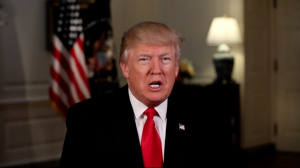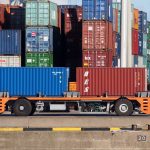President Trump’s New Executive Orders on U.S. Trade

President Trump
President Trump signed two executive orders last week to attack trade abuses and the United States’ trade deficit.
The executive order going after trade abuses is focused on enforcement of antidumping laws and countervailing duties.
Dumping is the practice where one country, let’s just say China, exports goods at a price that undercuts the market price of that good in the country where it is being imported, let’s just say the United States.
I pick the example of China and the United States because China, as an article from CNN puts it, “has repeatedly run afoul of the US’ anti-dumping laws”. The article points out how these executive orders come shortly before President Trump’s first meeting with Chinese President Xi Jinping. The article also doesn’t fail to point out that the United States’ largest trade deficit is with China.
Regardless of the timing, these executive orders make good sense for the U.S., and should not be as controversial as previous executive orders from President Trump.
In this first discussed executive order, the president points to 2.3 billion uncollected dollars in antidumping and countervailing duties owed to the U.S. government as of 2015. This is not just missing revenue from the debt burdened government, but a show of serious evasion of U.S. trade law.
The size of that dollar number also makes it clear that the U.S. Customs and Border Protection (CBP) is a major revenue source for the U.S. In fact, Military Technologies posted an article on this executive order that enumerates just how big of a revenue source the CBP currently is:
In Fiscal Year 2016, CBP seized more than 31,500 of counterfeit shipments and collected more $40 billion in duties, taxes, and fees, making CBP the U.S. government’s second largest source of revenue.
Speaking of counterfeit shipments, the executive order also includes a mandate for the enforcement, and possible creation, of laws protecting intellectual property rights.
We’ll see in a few months what kind of impact the executive order dealing with violations of trade and customs laws will have on importers. After reading the executive order, there are two things that stand out to me:
- A “covered importer” will be required to pay security liability on imports.
The executive order says that “covered importers” will need to “pay to provide security for antidumping and countervailing duty liability through bonds and other legal measures”.
This will be a new fee, or perhaps better described as a security deposit, that importers assessed as a risk will have to pay in order to import goods. Three separate criteria are listed to make an importer a “covered importer” and therefore subject to paying security on their imports. That’s what brings me to the next thing that stands out.
- “Covered importer” includes new importers.
One criterion that makes an importer a “covered importer” is being a first time importer.
The other two criteria are about an importer’s past raising the risk level of him or her failing to pay antidumping or countervailing duties. If in the past the shipper has failed to pay such duties or fines or just failed to pay them in a timely manner, the importer will be subject to paying the security.
While it may seem unfair that newbies are lumped in with offenders when it comes to risk assessment and assignment of security bonds (or other legal measures), it could be thought of like a credit score. Someone with no credit history is a higher risk to a lender than someone with a long history of paying their debts.
It will be interesting to see if a new shipper importing through a long established freight forwarder or NVOCC will still be assessed a risk, paying security on imports as a “covered importer”.
The other executive order mentioned at the top of this blog is for the creation of an Omnibus Report on significant trade deficits the U.S. has.
The report is to be made by the Secretary of Commerce and the United States Trade Representative (USTR), in consultation with the Secretaries of State, the Treasury, Defense, Agriculture, and Homeland Security, and the heads of any other executive departments or agencies with relevant expertise, as determined by the Secretary of Commerce and the USTR.
President Trump made it clear during his campaign that he wanted to turn around the U.S. trade deficit. In order to create any strategy to pull off such a lofty goal, a thorough assessment of the trade deficits the U.S. has with other country’s must be made and analyzed.
Both executive orders are published at WhiteHouse.gov but also appear in full below for your convenience.
ESTABLISHING ENHANCED COLLECTION AND ENFORCEMENT OF
ANTIDUMPING AND COUNTERVAILING DUTIES AND VIOLATIONS
OF TRADE AND CUSTOMS LAWSBy the authority vested in me as President by the Constitution and the laws of the United States of America, and in order to promote the efficient and effective administration of United States trade laws, it is hereby ordered as follows:
Section 1. Policy. Importers that unlawfully evade antidumping and countervailing duties expose United States employers to unfair competition and deprive the Federal Government of lawful revenue. As of May 2015, $2.3 billion in antidumping and countervailing duties owed to the Government remained uncollected, often from importers that lack assets located in the United States. It is therefore the policy of the United States to impose appropriate bonding requirements, based on risk assessments, on entries of articles subject to antidumping and countervailing duties, when necessary to protect the revenue of the United States.
Sec. 2. Definitions. For the purposes of this order:
(a) the term “importer” has the meaning given in section 4321 of title 19, United States Code; and
(b) the term “covered importer” means any importer of articles subject to antidumping or countervailing duties for which one of the following is true: U.S. Customs and Border Protection (CBP) has no record of previous imports by the importer; CBP has a record of the importer’s failure to fully pay antidumping or countervailing duties; or CBP has a record of the importer’s failure to pay antidumping or countervailing duties in a timely manner.
Sec. 3. Implementation Plan Development. Within 90 days of the date of this order, the Secretary of Homeland Security shall, in consultation with the Secretary of the Treasury, the Secretary of Commerce, and the United States Trade Representative, develop a plan that would require covered importers that, based on a risk assessment conducted by CBP, pose a risk to the revenue of the United States, to provide security for antidumping and countervailing duty liability through bonds and other legal measures, and also would identify other appropriate enforcement measures. This plan shall be consistent with the requirements of section 4321 and section 1623 of title 19, United States Code, and corresponding regulations.
Sec. 4. Trade and Suspected Customs Law Violations Enforcement. (a) Within 90 days of the date of this order, the Secretary of Homeland Security, through the Commissioner of CBP, shall develop and implement a strategy and plan for combating violations of United States trade and customs laws for goods and for enabling interdiction and disposal, including through methods other than seizure, of inadmissible merchandise entering through any mode of transportation, to the extent authorized by law.
(b) To ensure the timely and efficient enforcement of laws protecting Intellectual Property Rights (IPR) holders from the importation of counterfeit goods, the Secretary of the Treasury and the Secretary of Homeland Security shall take all appropriate steps, including rulemaking if necessary, to ensure that CBP can, consistent with law, share with rights holders:
(i) any information necessary to determine whether there has been an IPR infringement or violation; and
(ii) any information regarding merchandise voluntarily abandoned, as defined in section 127.12 of title 19, Code of Federal Regulations, before seizure, if the Commissioner of CBP reasonably believes that the successful importation of the merchandise would have violated United States trade laws.
Sec. 5. Priority Enforcement. The Attorney General, in consultation with the Secretary of Homeland Security, shall develop recommended prosecution practices and allocate appropriate resources to ensure that Federal prosecutors accord a high priority to prosecuting significant offenses related to violations of trade laws.
Sec. 6. General Provisions. (a) Nothing in this order shall be construed to impair or otherwise affect:
(i) the authority granted by law to an executive department or agency, or the head thereof; or
(ii) the functions of the Director of the Office of Management and Budget relating to budgetary, administrative, or legislative proposals.
(b) This order shall be implemented consistent with applicable law and subject to the availability of appropriations.
(c) This order is not intended to, and does not, create any right or benefit, substantive or procedural, enforceable at law or in equity by any party against the United States, its departments, agencies, or entities, its officers, employees, or agents, or any other person.
DONALD J. TRUMP
THE WHITE HOUSE,
March 31, 2017.
OMNIBUS REPORT ON SIGNIFICANT TRADE DEFICITS
By the authority vested in me as President by the Constitution and the laws of the United States of America, and in order to ensure the informed exercise of the authority over international trade granted to me by law, it is hereby ordered as follows:
Section 1. Policy. Free and fair trade is critical to the Nation’s prosperity, national security, and foreign policy. It is in America’s economic and national security interests to promote commerce by strengthening our relationships with our trading partners, vigorously enforcing our Nation’s trade laws, improving the overall conditions for competition and trade, and ensuring the strength of our manufacturing and defense industrial bases.
For many years, the United States has not obtained the full scope of benefits anticipated under a number of international trade agreements or from participating in the World Trade Organization. The United States annual trade deficit in goods exceeds $700 billion, and the overall trade deficit exceeded $500 billion in 2016.
The United States must address the challenges to economic growth and employment that may arise from large and chronic trade deficits and the unfair and discriminatory trade practices of some of our trading partners. Unfair and discriminatory practices by our trading partners can deny Americans the benefits that would otherwise accrue from free and fair trade, unduly restrict the commerce of the United States, and put the commerce of the United States at a disadvantage compared to that of foreign countries. To address these challenges, it is essential that policy makers and the persons representing the United States in trade negotiations have access to current and comprehensive information regarding unfair trade practices and the causes of United States trade deficits.
Sec. 2. Report. Within 90 days of the date of this order, the Secretary of Commerce and the United States Trade Representative (USTR), in consultation with the Secretaries of State, the Treasury, Defense, Agriculture, and Homeland Security, and the heads of any other executive departments or agencies with relevant expertise, as determined by the Secretary of Commerce and the USTR, shall prepare and submit to the President an Omnibus Report on Significant Trade Deficits (Report). To aid in preparing the Report, the Secretary of Commerce and the USTR may hold public meetings and seek comments from relevant State, local, and non-governmental stakeholders, including manufacturers, workers, consumers, service providers, farmers, and ranchers. The Report shall identify those foreign trading partners with which the United States had a significant trade deficit in goods in 2016. For each identified trading partner, the Report shall
(a) assess the major causes of the trade deficit, including, as applicable, differential tariffs, non-tariff barriers, injurious dumping, injurious government subsidization, intellectual property theft, forced technology transfer, denial of worker rights and labor standards, and any other form of discrimination against the commerce of the United States or other factors contributing to the deficit;
(b) assess whether the trading partner is, directly or indirectly, imposing unequal burdens on, or unfairly discriminating in fact against, the commerce of the United States by law, regulation, or practice and thereby placing the commerce of the United States at an unfair disadvantage;
(c) assess the effects of the trade relationship on the production capacity and strength of the manufacturing and defense industrial bases of the United States;
(d) assess the effects of the trade relationship on employment and wage growth in the United States; and
(e) identify imports and trade practices that may be impairing the national security of the United States.
Sec. 3. General Provisions. (a) Nothing in this order shall be construed to impair or otherwise affect:
(i) the authority granted by law to an executive department or agency, or the head thereof; or
(ii) the functions of the Director of the Office of Management and Budget relating to budgetary, administrative, or legislative proposals.
(b) This order shall be implemented consistent with applicable law and subject to the availability of appropriations.
(c) This order is not intended to, and does not, create any right or benefit, substantive or procedural, enforceable at law or in equity by any party against the United States, its departments, agencies, or entities, its officers, employees, or agents, or any other person.
DONALD J. TRUMP
THE WHITE HOUSE,
March 31, 2017.




